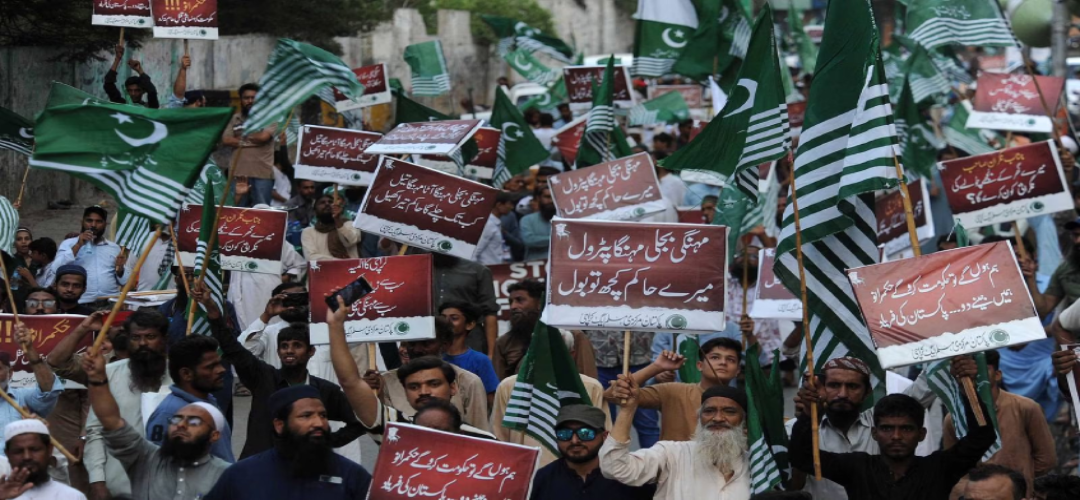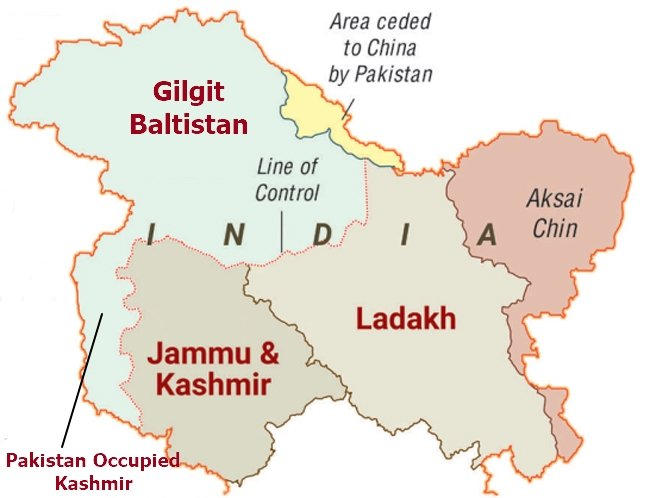Pakistan in Crisis: a Perfect Storm
September 9, 2023 | Expert Insights

The concept of a failed state remains relevant in modern-day international relations as more and more states teeter on the edge of an abyss. In its most basic definition, such a state is one whose political and economic system has become so weak that its government is no longer in control. This definition is quite broad in its coverage. There are nuances along the way. The core idea, though, is that a state should have the final monopoly of power in a nation. When it does not do this, chaos reigns. Today, many states compete for this dubious title, like Somalia and Haiti.
In India, many analysts would like to define our neighbour as one such state, although time and again, Pakistan has risen from the ashes to recover. However, this time, its political chaos combined with its economic chickens coming to roost after nearly five decades of gross mismanagement and corruption makes recovery much more formidable
Background
The issue that has grabbed eyeballs, especially in India, is the steadily deteriorating political situation in Pakistan-Occupied Kashmir (POK) and Gilgit-Baltistan (GB). Like the rest of Pakistan, rising prices, rocketing inflation and electricity bills that amount to more than a month's salary for most common citizens have brought the people out on the streets, burning the electricity bills and threatening to march to Kargil in the Indian state of J&K.
Gilgit-Baltistan (GB) has the region of Pakistan Occupied Kashmir to its south. The province of Khyber Pakhtunkhwa is to its west. It is connected to Afghanistan through the Wakhan Corridor in the north, while the Xinjiang region of China is to its east and northeast. The Indian territories of Jammu and Kashmir and Ladakh are to the southeast of this province. Originally a part of POK, it became a separate administrative unit in 1970 under the name “Northern Areas”. This territory has long sought full provincial status. In November 2020, the Imran Khan government temporarily agreed to this when it announced that the region would attain provisional provincial status after the 2020 Assembly elections there. Before he could fulfil this promise, Khan was himself overthrown.
Since its birth, the predictions of the demise of the Pakistani state have been widely overstated.
Analysis
Pakistan began its nationhood with certain inherent weaknesses. One of the most serious of these was the lack of institutions. In the heat of the Pakistan Movement, the Muslim League did not build up a second tier of leadership. This turned out to be a huge lacuna. The founder of Pakistan, Jinnah, died soon after its independence. The other major leader, Liaqat Ali Khan, fell to an assassin's bullet. The remaining political class was not worthy. In such a situation, the only other game in town was the Pakistani Army. And it took full advantage of this and ruled the roost for years.
When East Pakistan was lost, a more compact Pakistani state emerged. Eventually, political parties did form. But these were not normal political parties. They were feudalistic in nature and run by single families. Their corruption eventually led to the rise of Imran Khan through the Army’s patronage. All the provinces other than Punjab have been marginalized. Gilgit-Baltistan has been the most neglected of them all.
This time around, the crisis in Pakistan is much more serious than before. Several factors have coincided. The economic collapse has been accompanied by political dissolution. Years of mismanagement and nepotism are finally reaping their dividends.
The Pakistani centre is itself a divided house now. That is, the armed forces, which were supposed to be the pillar of the nation, are now doubting themselves. Years of covert and overt military intervention have totally hollowed out the system. The common Pakistani has had enough. There is a general sense of disillusionment.
The common Pakistani is feeling the pinch in a very hard way. The negative consequences of the concentration of political and economic power in the province of Punjab are now being realized. The outlying provinces are suffering much more than the centre. This includes Khyber-Pakhtunkhwa, Baluchistan, and Gilgit-Baltistan.
None of the major political parties (Nawaz Sharif-led PML, Zardari-led PPP, and Imran Khan-led PTI) has any moral standing to face up to the charges of corruption piled up against them, and they have been forced to cede political space to the all-powerful Pak Army. With Imran Khan secured in Attock jail and the top echelons of his party either resigned or jailed, PTI is no longer a credible political party.
All these feelings are being magnified in a region like Gilgit-Baltistan. Pakistan originally occupied this area as part of its acquisition of Kashmir. However, Islamabad quickly recognized the separateness of this region. So, it was separated from POK. But this separation was done not to give more freedom to the people of Gilgit-Baltistan. Instead, the main purpose was to control them more effectively. Gilgit-Baltistan is located strategically. It is the connecting link between China and Pakistan, and the CPEC passes through it. A portion of this province was handed over to Beijing illegally. This was against international law. The people of Gilgit-Baltistan had no say in this.
Apart from this, the region of Gilgit-Baltistan is also rich in mineral and natural resources. These have been exploited relentlessly by the Pakistani state. In an ideal world, the local people would have got a substantial share from this resource extraction. Rather, what they got was economic subjugation. Resources started moving from the province to the centre without the local people getting any benefits. Protest against such injustice was not possible up until now. The Pakistani Army and its intelligence service, the ISI, kept a close watch on the people of Gilgit-Baltistan. Only at the present with the weakening of central power have the local people here got the opportunity to voice their protest in an open manner.
On top of all this, the sectarian dimension has also come to play a big role in Gilgit-Baltistan. The majority of the population here are Shia Muslims. The majority of Muslims in Pakistan are of the Sunni denomination. Shia-Sunni divisions in Pakistan have been exacerbated since the official Islamization process began in 1979. Sunni fundamentalist groups have received official state patronage. They have carried out targeted killings of the Shia minority. In Gilgit-Baltistan, this has been accompanied by a forced demographic transition. Sunni Muslim settlers from outside the province have been given special privileges to settle here. They have further marginalized the native people.
China’s role in all this has added fuel to the fire. After illegally acquiring a part of this province, Beijing has decided to expand its influence in Pakistan through the Belt and Road Initiative, with Gilgit-Baltistan as the main entry point. Chinese projects have been carried out here in full swing. Chinese firms and workers have received extra-territorial rights. All this Chinese investment has not had any impact on the local economy.
The last straw for the people of Gilgit-Baltistan came this year. First was granting an illegal mining contract to a foreign company in the province. This was withdrawn after protests. The second was the formulation of a new oppressive income tax law. This has been seen as a continuation of the central government's unbridled exploitation of the province. And the third has been the arrest of a leading Shia cleric under Pakistan’s blasphemy laws. This has again been part of a wider pattern of sectarian discrimination. The main groups fighting for their rights in Gilgit-Baltistan are the Anjuman-e-Tajiran, an organization of the trading community and the Awami Action Committee.
This is the first time protestors in a Pakistani province have openly called for becoming a part of India. Gilgit-Baltistan is part of the historic state of Jammu and Kashmir, which belongs to India. Both the Indian Parliament and the Indian Government have stated this many times. Now, the people of Gilgit-Baltistan are themselves clamouring for Indian support.
Assessment
- These protests are a sign of the institutional failure of the Pakistani state. No temporary bandage can hide this fact. Unrest has been building up in Gilgit-Baltistan for decades. Only now do people there have the chance to voice their protest, as they have been encouraged by a perceived weakening of the centre, especially of the military, thanks to the virulent anti-army campaign of the PTI.
- Gilgit-Baltistan is part of the unfinished legacy of Kashmir. Islamabad is now receiving payback for the illegal annexation of this province.
- The international community cannot remain silent in front of these human rights violations by Pakistan. They must speak out strongly just as they speak out against human rights issues in Indian Kashmir.









Comments